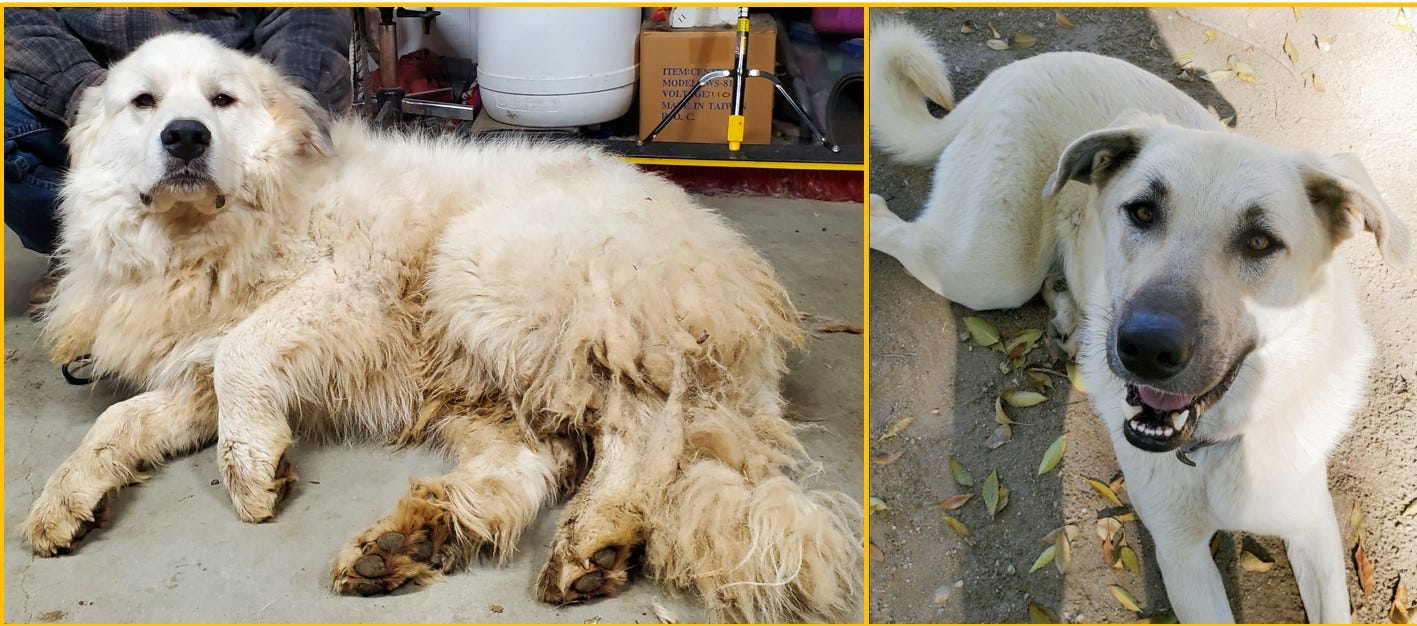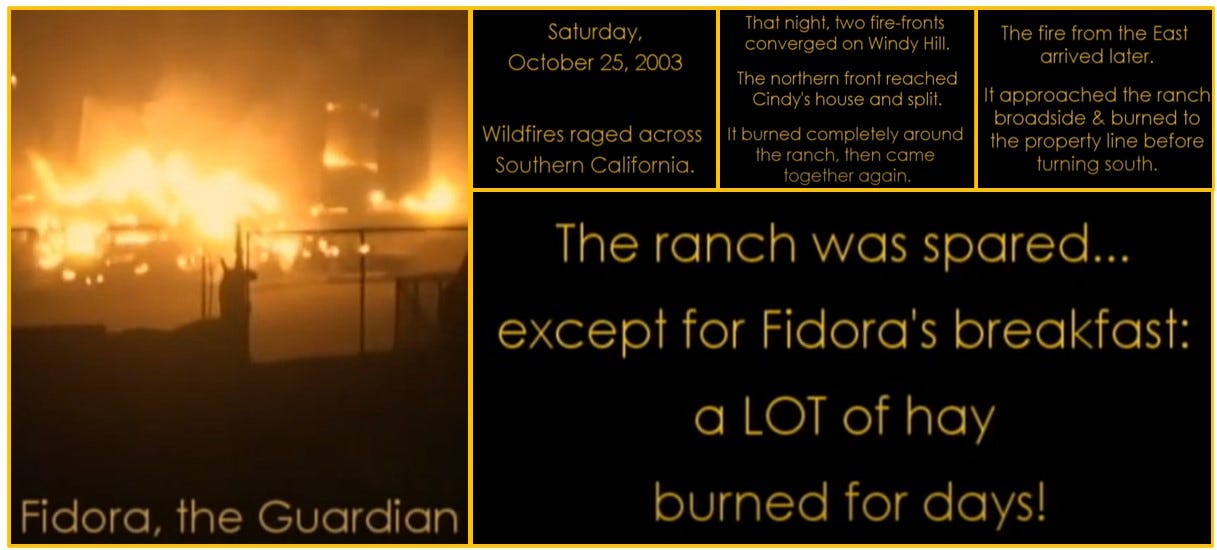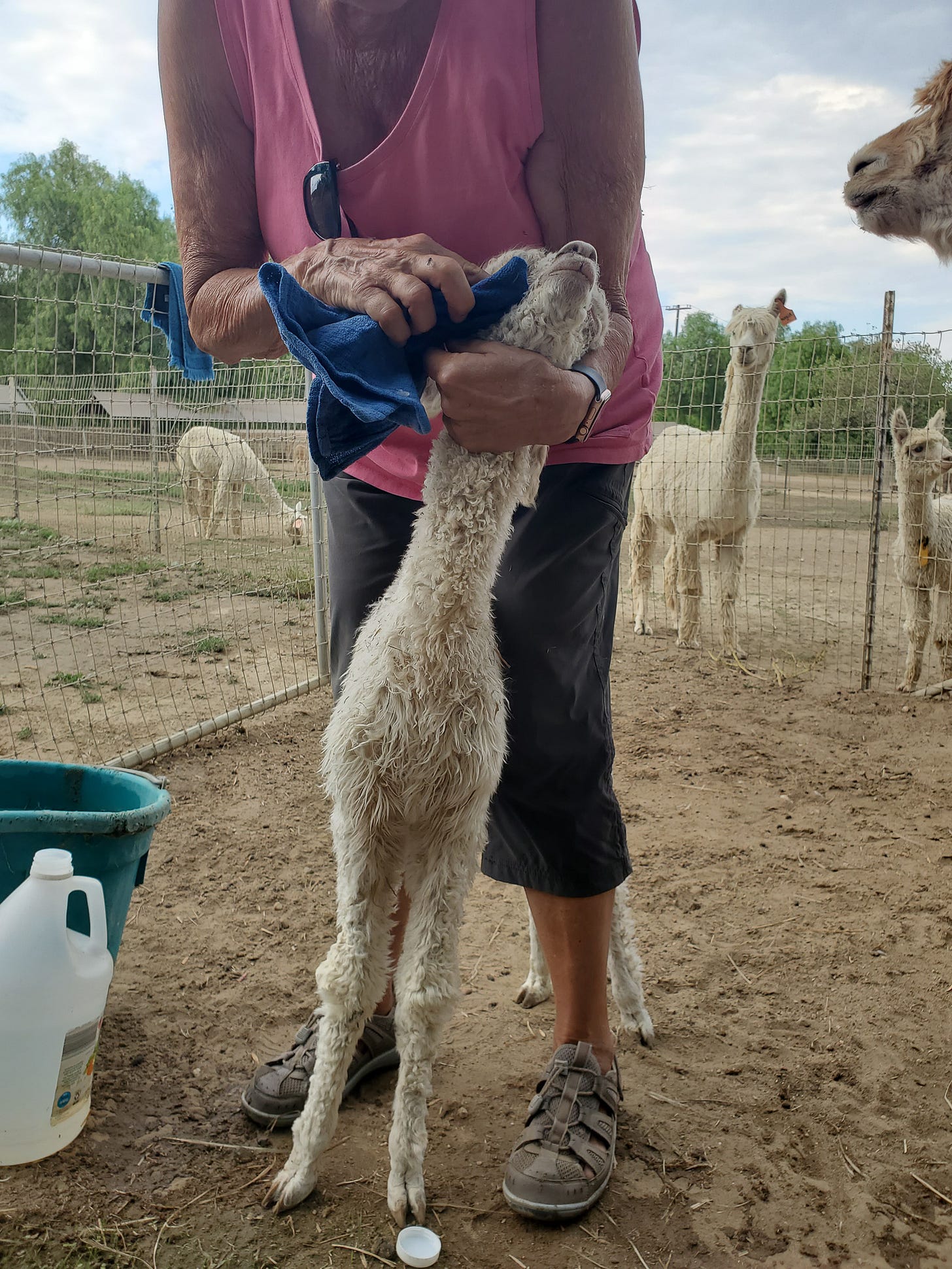Guardians of Windy Hill
Around the world, certain breeds of dogs have been bred throughout time be herd guardians. Cindy emphasizes to everyone she sells alpacas to that the only way to make sure their alpacas are safe is to have a one or more livestock guardian dogs & have strong, well-maintained fences. Cindy even directs them to a well written, resource-rich "Livestock Guardians Guide" on her website.

Windy Hill has two large dogs who guard nearly 200 alpacas across 20 or so acres day & night. One is a Great Pyrenees (Zeke) & the other is an Anatolian Shepard (Tucker). The ranch, located in Somis, CA, is surrounded by orchards, horse stables, & agricultural fields with very little surrounding land left undeveloped. Alpaca predators in the Somis area are primarily coyotes. In more remote areas, such as the high desert northeast of Los Angeles & the San Bernardino Mountains, add mountain lions, cougars, & a newer menace to the list. Turns out, people dump the newer menace - their domesticated dogs, including pit-bulls & rottweilers - into the wild to fend for themselves. These dogs tend to form small packs to hunt food.
Tragedy & Triumph#1. Wild Dogs Attack an Alpaca Herd

In early September, I arrived at the Alpacas at Windy Hill ranch to find a new herd of 20 or so alpacas dispersed in the small & larger pens adjacent to the barn. After observing them for a few minutes I headed to wait for Cindy under the trees & find out more about them. While it's not unusual to see a few new alpacas in the pens, this was an unusually large group. Cindy arrived & shared a heartbreaking story.
One Tuesday mid-day a couple weeks ago, Cindy got a frantic call from a long-time friend and alpaca owner who lives in a fairly remote area in the high desert, about 1-1/2 hours’ drive east of Windy Hill. The friend (I'll call Sue, not her real name) who has about 20 alpacas, told the story of her alpacas getting killed by wild dogs. The dogs came on Sunday night. She called the sheriff & local animal control, to no avail. She stayed home from work on Monday to check for fence repairs & tend to her alpaca herd. Since the wild dogs didn't return, she thought it was safe to return to work on Tuesday (involving a 2-hour commute each way by train to/from downtown Los Angeles). She returned home to find the dogs had returned and killed another alpaca & had attacked at least one other, who survived but was seriously injured.
She called Cindy, who had sold Sue her first alpaca years ago. After much discussion of options, Cindy realized the only way to save her friend's herd was to go get them and bring them back to Windy Hill & board them until Sue decides what to do next. So, mid-day, Cindy drove with her livestock truck & trailer, loaded up all of Sue's alpacas, even the injured one, brought them back to Windy Hill, unloaded them, & placed them in pens nearest to the barn. Loading and unloading the 20 alpacas was even more challenging as most hadn’t had trailer experience and were reluctant to load into it. Already traumatized, the alpacas were quick to react to the site of the Zeke & Tucker, the Windy Hill dogs who would guard them at night, but never attack them.
The next day, Dr. Nenn (see this journal entry for a look at Dr. Nenn’s fabulous vetmobile) arrived to tend to the injured alpaca. She was able to save one of the alpaca's testicles & repair his injured haunch. It was a triumph in keeping Sue’s herd patched up & safe. Meanwhile, Cindy is boarding Sue's entire herd until Sue decides what to do next.
Unlike Cindy, who has an active breeding ranch, Sue, a talented fiber artist, has used her herds' annually sheared fibers to make beautiful clothing & artworks for nearly 20 years. Should she sell her herd? If she sells her herd, should she sell her property? Sue is nearing retirement and any decision she makes could be a major change in lifestyle.
As Cindy was sharing this tale of tragedy with me, I expressed my astonishment that she actually went & got the herd, brought them back to Windy Hill, coordinated the vet visit the next day, & is still boarding them. I wondered out loud how many people would actually do the same. Cindy replied matter-of-factly, "most people couldn't because they wouldn't have had the trailer and the boarding space to put them, which is why she called me." Cindy simply stated, "We do this sort of thing in our alpaca community. We're there for each other. You can always count on an alpaca person somewhere who's going to come help." And then she shared another tale of tragedy & triumph with me.
Tragedy & Truimph#2. The 2003 Wildfire @ Old Windy Hill
Cindy began, "When I was at my old place, Jimmy, a friend & a Community Emergency Response Team (CERT) member called to alert me that a wildfire was rapidly coming towards my ranch & to start evacuating immediately.
Jimmy's brother, part of the first responders in Chatsworth, CA, had called Jimmy to say the wildfire was on the ridge across the street from the old Windy Hill ranch and heading directly through it. Thankfully he called several hours before the first fire arrived at the street Old Windy Hill was on. Jimmy brought his livestock trailer over to the old Windy Hill ranch & recruited five others to bring their trucks & trailers, too. Cindy's vet borrowed a trailer from somebody. Somebody else brought their trailer. All in all, Cindy & the others evacuated 150 animals off the ranch and most of the house packed before the fire actually got close. It was about midnight when they got the alpacas to Jimmy's place, which wasn't in the in the path of the wildfire.
Cindy continued, "Because my driveway was so steep, we couldn't drive the trailers down or up it. So, we walked every animal on a halter & lead rope up the road, down the driveway & out to the place where the trailers could pick them up. The next day, we had to do the whole thing over again when it was safe to take the alpacas home.”
"Did your house burn?" I asked. Cindy replied, "No, the fire came over the hill, up the driveway & went around the house. I know this due to the fact that my crazy friend Kathy stayed there. She helped us load the alpacas & when we got done, she declared 'I'm staying and filming this! I'll just jump into the stock tank (full of water) if I need to.' So, she stayed and filmed the firestorm surrounding the Windy Hill ranch.”
"If she hadn't been there filming, I'd never have been able to comprehend some of the miraculous things she captured. The fire came up the hill & burned the fruit trees up to the base of my carport, which melted the PVC line that ran along the edge of my carport. When that happened, all the water pressure from the whole house poured down the hill & put the fire out. At the base of my carport! Wow. Unbelievable!"
Cindy watched the raw footage about three days after the fire. I asked her what it was like for her to watch it. "You know, I just sobbed through the whole thing. It was so unbelievable. I had been panic stricken for 48 hours straight. I didn't know what to expect after we finished unloading the animals at Jimmy's. I kept wondering what I needed to go back & try to save more from the house because I was sure it was going to go down. I couldn't imagine how we could avoid it. It still makes my heart race to think about it. It was the most terrifying thing I've ever been through." Here's a link to the filmmaker's "Wildfire on Old Windy Hill", by Cathy Colleen Powers (no relation to me).
Completely Unrelated End Notes





